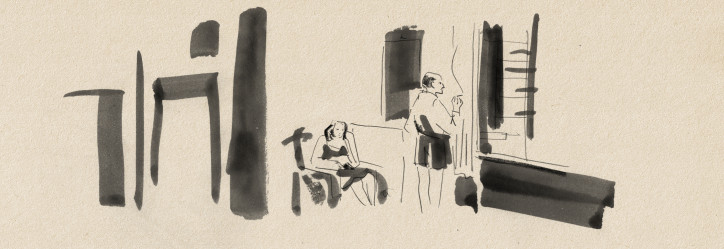
In the famous railway platform scene in The Hours, Virginia Woolf says that she misses the city, she misses city life. I understand her so well, writes Maciej Stroiński.
The greatest concentrations of people, known as cities, are currently ‘cancelled’. Perhaps because Wuhan is also a city. Today the role of the city is to not fulfil its role, to not gather people together. Everyone’s supposed to be at home, left in their estate almost as if in a castle; my home is my hotel and my hospital. Nothing pulls you to the centre. The cinemas are closed, the restaurants are closed, everything’s closed, and the worst is that the theatres are, but as it turns out, Wisława Szymborska was right: “Without that love, you can live.” In To Damascus, Strindberg asks: “How can you live without music?” and years later we can tell him it’s enough to have YouTube, if you don’t mind spending your life in front of a screen. I know “the idiocy of rural life” – as Marx put it – from my own experience. Idyllic vacations don’t appeal to me at all, and I think I will always remain a village boy for whom going to the forest, the lake or the mountains is like going nowhere. Life is found elsewhere: in places with a market and a theatre. And so Houston, we have a problem, now a temporary one, but everywhere is like a village, and nothing’s happening anywhere. In the end, we really do live in a global village. It’s not a metaphor anymore!
I know – what’s the problem? The answer is that it’s a first-world problem, which may end in the spring, but why not have small ones, too, in addition to big ones? My small problem concerns the energy we cut off in March, and again in October, for health purposes: social energy. So why are we surprised that the streets are exploding? In these conditions, what else is there to do but explode? I’d go to a riot, even if I didn’t support it – for the event itself, for ‘things happening’, the grouping of bodies and faces – that is, half-faces hidden under masks. As the early Adele sang in her amazing song of praise for a city, “Hometown Glory”: “I like it in the city when two worlds collide. / You get the people and the government, / Everybody taking different sides. / Shows that we ain’t gonna stand shit, / Shows that we are united, / Shows that we ain’t gonna take it!”
The coolest part of life in this or another city is life on the town. Getting out of your house, things being different in some way, looking at other people, eating dinner next to them, watching shows, you know. Going to town used to fit with us like a charger in a phone. Now it’s best to save our batteries.
Literature contains people who are incurably in love with cities, even to their own detriment. For example the Prozorov sisters from a Chekhov play, who sincerely want to go “to Moscow”, and the more they don’t go there, the more they suffocate in the provinces. One heroine of a Bernhard play (Heldenplatz) is truly harmed by the city, but only in the city is what she loves: “Frau Professor has always hated Vienna / expect she loves the theatre / If she doesn’t have the theatre / she has nothing.” And what does Virginia Woolf long for most in the story The Hours? For a return to the capital: “It is better to die raving mad in London than evaporate in Richmond.” The refrain of this book is taken from Mrs Dalloway: “Life, London, this moment of June.” For her, London means life.
I live in Kraków, in the Krowodrza district. When I get tired of being in my home, I go out to what used to be the city. I ‘get dressed up’ in scent, if only for courage. I don’t go to the Market Square; why, it’s there that you can see how much there is nothing going on now. I prefer Aleje Trzech Wieszczów. It takes me 15 minutes on foot (three on a scooter), I sit down at a bus stop; I simply sit there. It’s best at rush hour, on Friday afternoon, and that means in the middle of the night, because it’s winter. On this stinking avenue, the queen of Polish smog, until coal is banned. The ancient smoke in the air is recalled by the deposits on the facades of the buildings, and meanwhile I sit, I look. A line of cars, a tailback, sometimes somebody honks their horn – that’s what’s left of life in the city, until life returns. Parks, trams, food delivery. You could say I miss everything.

Translated from the Polish by Nathaniel Espino
Dear Readers,
There are difficult and unsure times ahead of us. We believe that by supporting each other we will survive the winter, as well as all future seasons that pose new challenges for us. That is why we would like to encourage you to share your experiences, lockdown stories and strategies on how to survive the current havoc. We will publish the most interesting texts on our website.
The length of the text should be a maximum of 4000 characters (with spaces). Please send it to [email protected] and include ‘Reader Submission’ in the subject line.
All the best,
Przekroj.pl/en Team











